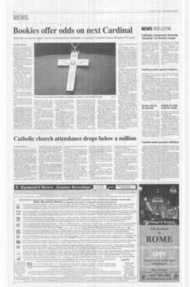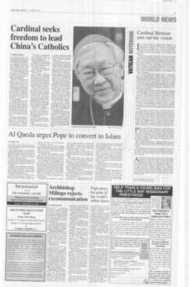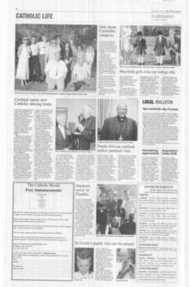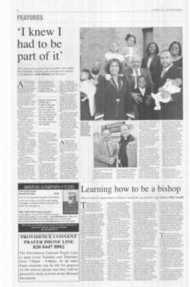Page 5, 6th October 2006
Page 5

Report an error
Noticed an error on this page?If you've noticed an error in this article please click here to report it.
Tags
Share
Related articles
Bertone Describes Warnings On Iraq As 'prophetic'
Pope Benedict Xvi Has Been Dragged Into A Mystifying Scandal
Pope Chooses New Right-hand Man To Reform Roman Curia
Can The Pope Win Over The Sspx?
Pragmatic Pope Appoints A Pastor
Cardinal Bertone
sets out his vision
In a marked change of emphasis that underlines the urgency of the situation, the Holy See is calling on the international community for a "universal commitment" in favour of the world's poor. The new approach was outlined by Cardinal Tarcisio Berione's in first major address as Secretary of State to the diplomatic corps accredited to the Holy See."
"We need a universal commitment in favour of the most disinherited of the planet, of the poorest, of people who often seek in vain for something to live, and so that their families can live," the cardinal told nearly 200 diplomats in an address delivered on September 29 in French in the Ducal Hall of the Vatican Apostolic Palace. "The dignity, freedom and unconditional respect of every human being in his fundamental rights, in particular; his freedom of conscience and religion, must be part of our primary concerns, as we cannot be lacking in solidarity with the fate and future of our brothers and sisters in humanity."
The cardinal's diplomatic agenda focused on three main areas: overcoming poverty, working for peace, and building diplomatic ties with all nations. None of these goals is new and Cardinal Bertone drew many times in his speech on the words of John Paul H. But the new emphases do betray a certain "Benedictine" flavour: pushing for a united front against world poverty, fighting against preventable diseases, taking a more robust stand on religious freedom and calling for disarmament of all weapons (including the "ethical value" of unilateral disarmament).
A number of these priorities will rest uneasily with British Government policy. Not only did Cardinal Bertone implicitly call for the disarmament of nuclear as well as conventional weapons, he also brought into the scope of diplomacy protection of the unborn and denounced violence of all kinds inflicted on women and children (the Government has yet to act on its electoral pledge to revisit abortion law). At the ethical level, the cardinal also condemned all wars as a means to "resolve eventual differences between states", although sonic argue his remarks still allow for just war. The Holy See does, however, support the Government's push to fight world poverty.
In recent months, there has been a shift away from diplomacy under Benedict XVI and more time given instead to inter-religious, eA;clesial and structural reform matters. But with this speech, the Holy See has demonstrated its traditional concern with the affairs of states, the importance of which was perhaps driven home by the controversy over the Pope's University of Regensburg address. "It's one thing for religious to deal with religious," says one diplomat, "but the consequences of the crisis over Islam shows that the Holy See's relationships with states are of vital importance and sensitivity".
popeBenedict XVI was clearly aware of this importance when he received the credentials of the new German ambassador to the Holy See last week. The Holy Father urged the government of Ambassador Hans Henning I lorstmann to protect matrimony and the family from changes in today's concept of married life, and spoke of the "totally unjustifiable abortions that continue to claim the lives of many unborn children".
He also called on Germany to uphold the rights of asylum seekers, called for tolerance but not indifference in society, and warned of the ethical problems of embryonic stem cell research.
His warning on such research was directed not only at Germany but also, for the first time, to Europe as a whole. In November, the European Parliament is expected to pass legislation that could allow funding for some research on embryonic stem cells.
Although the furore caused by the Pope's Regensburg speech last month has abated somewhat, the Italian authorities are taking no chances. In view of the "delicate international situation", the authorities say they are to increase the number of police from October 30. The move is an "urgent necessity" in order to guarantee full "vigilance, protection and escort". There are no plans, however, to prevent the Holy Father from greeting the public at general audiences while travelling in an open-top jeep. Security for his scheduled trip to Turkey, however, is expected to be a quite different matter,
Rome Correspondent: Edward Pentin
E-mail: vaticannotebook0 yahoo.com
blog comments powered by Disqus

















